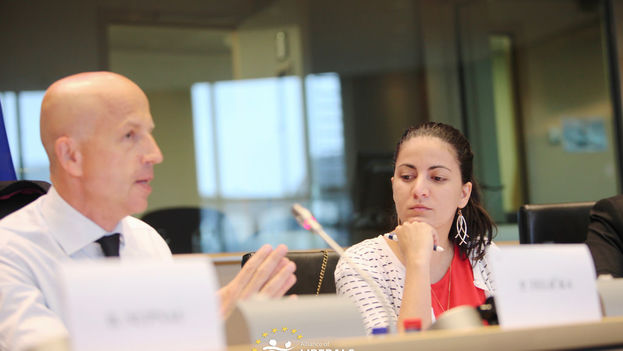
![]() 14ymedio, Mario Felix Lleonart, Brussels, 1 June 2016 – Cuban representatives who participated in the conference in the European Parliament held last Tuesday in Brussels about relations between the European Union and Cuba were skeptical about the cooperation agreement that will be signed by both sides at the end of the year, or at the latest, at the beginning of 2017.
14ymedio, Mario Felix Lleonart, Brussels, 1 June 2016 – Cuban representatives who participated in the conference in the European Parliament held last Tuesday in Brussels about relations between the European Union and Cuba were skeptical about the cooperation agreement that will be signed by both sides at the end of the year, or at the latest, at the beginning of 2017.
The Island’s delegation – Rosa Maria Paya, promotor of the Cuba Decides campaign; Pedro Fuentes Cid, spokesman for the Historical Center of Political Prisoners; and the author of these lines, a Baptist pastor and manager of the Cuban National Conference – lamented that civil Cuban society has not been taken into account in the negotiations for the agreement that will substitute for the European Union Common Position which, since 1996, has delineated relations of the twenty-eight EU countries with the Island.
Also present at the meeting, organized by the Alliance of Liberals and Democrats for Europe (ALDE), were Ben Nupnau, official from the European Foreign Service Division for Mexico, Central America and the Caribbean, and Pavel Telicka, vice-president of ALDE.
Nupnau expressed Europe’s good intentions for the positive effects that the cooperation agreement could have on democratization and respect for human rights in the Cuba. Nevertheless, the Cubans present argued that the Island’s government had not given the EU any expectation of guarantees about human rights and democratic freedoms, given the persistent signs of verifiable repression in 54 Sundays of harassment of the Ladies in White and the monthly statistics of arbitrary detentions produced by Cuba’s Human Rights and National Reconciliation Commission.
The Island’s delegation pointed out the secret character that so far tarnishes the agreement and questioned the fact that neither European nor Cuban citizens had been able to express opinions about its contents.
The delegation also encouraged the EU, if it is in competition with the United States with respect to Cuba, to also compete in support of civil society. The panelists emphasized that, in spite of pressure by Cuban negotiators, the US had not given up doing so, while the EU only supports civil society as conceived of or endorsed by the government in Havana, the very one that has tried to muzzle it.
The EU, according to participants in the meeting, must be aware of the close relations that the Cuban government has with enemies of Europe and of democracy such as North Korea, Russia and Belarus.
The Cuban ambassador in Brussels, Norma Goicochea Estenoz, declined the invitation to participate in the meeting and sent an email to explain that she could not meet in the same place as “mercenaries.” The diplomat acted consistently with the intransigent position of the Cuban government, capable of sitting down to negotiate with the biggest powers, even when, as in the case of the United States, it has to do with its historical enemy, but refusing to engage in dialog with its own people, whom it thus insults and denigrates.
On Wednesday, the official presented a complaint to the European Foreign Service about the ALDE conference. Some supposed that it was going to make clear that its embassy had nothing to do with certain attendees who took advantage of public intervention time in order to question the legitimacy of the panelists, matching the views given in her email. It is supposed that those who suspect that may be right, given that the reason for her urgent visit to the European chancery was to again lash out against the panelists and, in turn, also against Telicka and ALDE.
Translated by Mary Lou Keel
